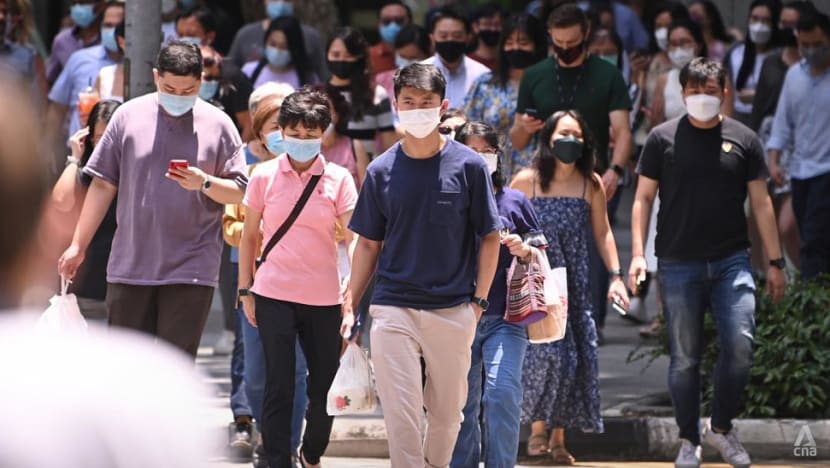MOM does not 'arbitrarily' adjust number of EPs, S Passes issued amid job market fluctuations: Tan See Leng
Such a "protectionist measure" would cause business uncertainty and undermine Singapore's reputation, Manpower Minister Tan See Leng said.

People wearing protective face masks in the Central Business District in Singapore on Mar 25, 2022. (Photo: CNA/Gaya Chandramohan)
SINGAPORE: The Ministry of Manpower (MOM) does not intervene in the job market by “directly and arbitrarily adjusting” the number of Employment Passes (EPs) or S Passes it issues when there are business fluctuations, Manpower Minister Tan See Leng said on Wednesday (Feb 22).
In a written response to a parliamentary question from MP Gerald Giam (WP-Aljunied), Dr Tan said the ministry should not micro-manage the labour market.
“Adopting such a protectionist measure would cause significant business uncertainty, and undermine Singapore’s reputation as a transparent, competitive, and reliable location for businesses,” the minister said.
Mr Giam had asked whether the job market in the information and communications sector is shrinking and if MOM has reduced the number of EPs and S Passes issued to foreigners looking for roles in the sector.
His question comes as global tech companies including Meta and Alphabet have announced layoffs, with employees in Singapore affected by the retrenchments.
Adjusting the number of work passes issued to foreigners “would go against how we have thrived over the decades by being an open economy and a business hub”, Dr Tan said in a written response.
“Instead, we have a comprehensive suite of measures in place that allows us to attract more investments, and grow the pie to create many more good jobs and career choices for Singaporeans.”
ENCOURAGING COMPANIES TO HIRE LOCALS
Dr Tan said firms are incentivised to hire and retain locals through various policies.
For example, the Complementarity Assessment Framework (COMPASS), a new points system for EP applicants that takes effect on Sep 1, gives fewer points to companies that have a low share of local professionals, managers, executives and technicians (PMETs) compared to their industry peers.
With fewer points, it will be more difficult for such companies to meet the requirements for their EP applications.
EPs are for foreign professionals, managers and executives who earn at least S$5,000 a month.
Meanwhile, the S Pass sub-Dependency Ratio Ceiling limits the number of foreign workers a company can hire to a given percentage of its total workforce.
“Hence, should the firm’s total workforce fall when locals are amongst those retrenched, the S Pass quota available to the firm would decrease and the firm will not be able to hire as many S Pass holders as before,” Dr Tan said.
New S Pass applicants have to be paid a salary of at least S$3,000 a month, and that figure is set to rise to at least S$3,150 from Sep 1.
MOM has set a quality benchmark for EPs and S Passes to be pegged to the top one-third of local PMETs and associate professionals and technicians respectively, the minister said.
“This ensures that firms do not turn to cheaper options as a first resort, to ride out a business downturn,” he added.
Employers are also required to advertise jobs on MyCareersFuture and fairly consider all candidates before submitting an application for an EP or S Pass holder.
When companies retrench workers, they are advised to take a long-term view of their manpower needs, including the need to maintain a “strong Singaporean core”.
“This means that retrenchments should generally not result in a reduced proportion of local employees,” said Dr Tan.
He added that retrenchments should be a last resort, and deciding who will be laid off should be based on objective criteria including employee merit and preserving skills to ensure business sustainability.
The minister said it is natural that changes in external demand will impact companies and jobs in Singapore’s open and connected economy.
“We have designed our policies to safeguard good local employment outcomes across the business cycle,” he said.
"CAUTIOUSLY OPTIMISTIC" ABOUT INFORMATION & COMMUNICATIONS SECTOR
Global headwinds may weigh on labour demand in the near term, said Dr Tan, adding that Singapore can expect to see a dampening in hiring demand and a slower increase in total employment in the fourth quarter of 2022.
As of September 2022, total employment in the information and communications sector grew by 13,700 in the first three quarters of 2022. The number of job vacancies in the sector at 9,300 in September 2022 was also higher than that observed in the same period in 2021.
"We remain cautiously optimistic about the long-term prospects of the (information and communications) sector as tech firms continue to pursue opportunities in Southeast Asia’s growing digital economy from Singapore," said Dr Tan.
Tech skills also continue to be in high demand both within and beyond the sector as the pace of digitalisation accelerates across Singapore's economy, he added.



















